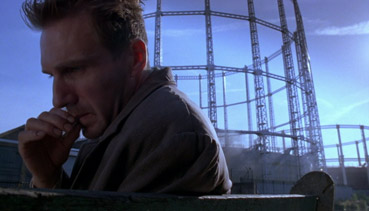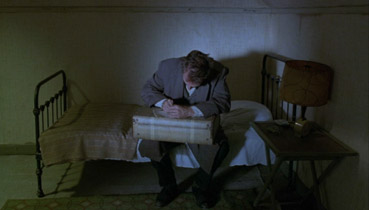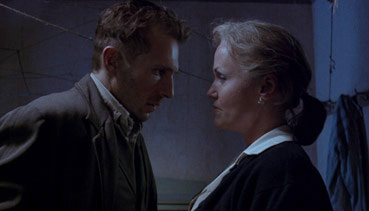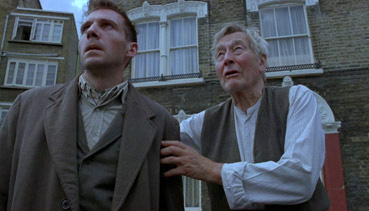"To
be faithful to a novel you have to betray it in cinematic
terms." |
Spider director David
Cronenberg |
How
do you go about raising funding for a film like Spider?
Its central character is a schizophrenic who has recently been released
from an asylum and is almost completely unable to communicate
with others, his speech a series of almost unintelligible
mumbles to no-one in particular and his notepad tightly
crammed with scribblings in a language of his own invention.
As he arrives in London and seeks out the halfway house
in which he is to lodge, the camera repeatedly isolates
him in often eerily empty landscapes. Later in the story,
the people around him and those in his own memory appear to shift
and swap identity. We are prompted to connect with
him not because he is engaging or witty or likeable,
but because the film itself climbs inside his head
and takes residence there, forcing us to see the world
as he does, to share his recollections and his confusion
and fear of everything and everyone. There's no voiceover to provide clarification, no sudden opening up
of the character to allow us to warm to him – this is
one hard sell to even the most adventurous funding source.

I
would venture to say that there are few filmmakers in
western cinema who would even consider taking on such
a story, and fewer still who could pull it off with such
aplomb. David Cronenberg has never shied away from so-called 'difficult'
projects – indeed, part of what makes him such a great
outsider director is that he positively embraces them. Initially a genre film-maker of distinctive style,
Cronenberg has managed to widen his scope without diluting
his vision a fraction, creating works as individually
compelling and diverse as Dead Ringers, Naked Lunch, Crash and eXistenZ, and yet infusing each with
distinctively Cronenbergian thematic meat. The destruction
or mutation of the body, the loss of free will to the
controlling power of obsession, the liberational strength and risks of non-conformity
are all elements that he openly celebrates. With Spider this focus is narrowed considerably, as we do not engage
with the central character and observe his slide into
self destruction as we did with Beverly Mantle in Dead
Ringers or Jeff Brundle in The Fly – when we meet Spider, the damage has already been done, and
we are invited to work with him as he attempts to unravel
an unclear horror from his past and confront the issues
that changed him from an everyday young boy into the
seriously disturbed adult that he has become.
This
is a film experience in which the audience is required to both work and
have faith. There is no initial narrative hook, no snappy
opening and few real clues in the early stages to indicate
where the story will later head. The film moves at Spider's
own unhurried pace, revealing key information in a way
that only becomes fully clear in the final few minutes. On paper this
is a risky approach, but it proves utterly compelling
from the very first shot, a slow track down a station
platform though a throng of commuters to reveal the
lone and confused title character. This may not be
the traditional Hollywood opening, which too often consists of a wearily predictable burst of action – a technique born
from the terror of losing the short attention span audience
in the first three minutes – and we may not be able to
immediately identify with Spider, but he holds our attention
from the start through the simple fact that he is interesting.
If the story itself is a puzzle for the audience and
the film's central character to solve, then so is Spider himself, an enigma
waiting to be unraveled in the classic
mystery mode. It's an intricate process, and Cronenberg drops
the narrative clues in a manner that repeatedly moves the
story forward and yet continues to protect Spider's
dark secret until the film is ready to reveal it. On
a second viewing, intrigue and guesswork are replaced
by a sense of wonder at the extraordinary complexity
of this seemingly minimalist approach, providing
as it does a better understand the workings of Spider's mind and
how the events of his past have continued to shape his
present.

If
considerable credit must go to Cronenberg for the making this work as well as it does – his camera placement and editing are key factors
in creating the sense of dark mystery that surrounds
the central character – then he shares it with Ralph Fiennes, who is
nothing short of extraordinary as Spider, immersing
himself so completely in the role that you genuinely
forget you are watching a performance. Every twitch,
mumble, movement and nuance feels utterly authentic,
and he is very convincingly presented as a man robbed
of his dignity and privacy, one for whom a simple
bedsit room is a source of unexplained terrors. It seems
almost ironic that although determined not to produce
a case study of schizophrenia, Cronenberg, screenwriter
Patrick McGrath (who also wrote the source novel)
and Fiennes have nonetheless built a far more convincing
and unsensationalist film around the subject than the
more widely discussed and (over-) praised A Beautiful Mind.
This is film acting at its least self-serving, a brilliant
performance that is nonetheless never flashy or attention
grabbing, and thus not the sort that attracts
the attention of the Academy.
But
this is no one-man show. Equally remarkable is the superb
Miranda Richardson, who plays two very distinct characters
(this is no gimmick and essential to Spider's own memories
and perception of his present), and later even melds one
of them with a character played elsewhere in the film
by a different actress. She performs each to perfection,
her performance as the tarty Yvonne in particular being
absolutely spot-on – the accent, facial expressions and body language
are so right that it's worth a viewing of
the film just to watch Richardson at work. Fine support
is provided by Gabriel Byrne as Spider's father, a role
he confesses was probably the hardest of his life (you
need to see the film and watch the extras to fully understand
why), Lynn Redgrave as the frosty landlady Mrs. Wilkinson,
and John Neville as fellow halfway house resident Terrence,
a man who exudes a sense of long-sibce crushed rebelliousness.
Slowly
paced but darkly compelling, Spider is a beautifully performed and constructed work. Particular
credit should go to director of photography and Cronenberg
regular Peter Suschitzky, who lights interiors with
a sometimes unsettling combination of naturalism and
surrealism (a style that is most strongly evident in
the potentially mundane but striking long shot of Spider
framed against a cupboard in his room, writing in his
journal with his back to the camera), Howard Shore's
unsettling low-key score, and Andrew Sanders' atmospheric
production design. Typically of a Cronenberg film, all
of those involved in the production appear to have a
completely unified view of the material, creating the
sense that everything you see on screen, from the gigantic
gas storage cylinders to the wallpaper in Spider's room
and the very string he uses to create his webs, has been
pulled from the inside of Spider's own mind.

Although lacking
the visceral thrills of Cronenberg's genre works or
even the taboo-busting controversy of Crash, Spider demonstrates clearly just how
masterful a director Cronenberg has become, and the film shines
not just as a gripping and imaginative psychological
drama, but as a showcase for his ability to tell a complex,
intelligent story in purely cinematic terms.
Framed
at 1.85:1 and anamorphically enhanced, this is a pleasingly
crisp and well balanced transfer with first rate contrast
and strong colour reproduction, very nicely reproducing
the browns and greys that dominate much of the production
and costume design. Very few compression artefacts are
visible, no mean feat given the studied gloom of many
scenes. A very nice job.
The
5.1 soundtrack is a resolutely unflashy affair, but
there is subtly effective use of the full sound stage,
with rain, wind and other location atmospherics creeping
up on you from behind, and some very nice separation
work on some sound effects (Gabriel Byrne's night-time
cycle ride to the allotments and the window breaking
in the asylum are very good examples). The almost David
Lynch-like background noises in Spider's bedsit are
particularly effective, though there is surprisingly
little use of the lower frequencies. An impressively
and appropriately subtle mix.
The
crucial difference between the UK region 2 release of
the film and the US region 1 under examination here is that this one includes
a David Cronenberg Commentary,
which for fans of the director makes it the one to have.
Cronenberg's typically soft-spoken approach provides a
wealth of information on the film, specifically his approach
to the material and the collaborative process of working
with his actors and crew in a country that was not his
own, something that prompts an interesting (and accurate)
observation about "a certain type of English pub
anger," and there is a handy explanation of allotments for the non-British viewers. Towards the
end, this drops off in favour of describing the on-screen
action, or at least its subtext, most of which should
be clear after a couple of viewings, though Cronenberg
still has an interesting alternative reading for the ending.

There
are three featurettes, all 4:3
and assembled from the same set of interviews.
In
the Beginning: How Spider Came to Be (8:09) looks at the considerable problems of financing
the film and getting it up and running and says a lot
about the determination of those involved to see the project
through, especially given that at the time of the interview
Cronenberg and several of the key cast and crew had still
received no payment for their work.
Weaving
the Web: The Making of Spider (9:08) deals with the approach taken by Cronenberg and
his collaborators to planning and shooting the film. The
majority of the interview time is spent with Cronenberg,
and although interesting it does tend to repeat aspects
already covered in the commentary (well, it depends on
which order you play the extras).
Caught
in the Spider's Web: The Cast (12:23) also doubles up on the commentary and the Cronenberg
interview material, but the cast interviews still provide
plenty of useful viewpoints on what was clearly a challenging
job for all concerned.
There
are very basic Filmographies for Cronenberg, McGrath, Fiennes, Richardson, Byrne and
Redgrave.
Finally
there are Trailers for Spider and other Columbia Tristar releases Adaptation, Punch-Drunk Love and The
Devil's Backbone.
Spider is the sort of film that has a surface air of minimalist simplicity,
which quickly disperses to reveal a film of extraordinary
narrative and thematic complexity, to the extent that
second and third viewings prove possibly even more rewarding
than the first, as the pieces of the psychological jigsaw
can more clearly be seen being laid into place. The performances
are divine and Cronenberg's direction consistently assured,
creating what he has rightly described as an expressionist
film that tells the story from inside the head of its
protagonist. Time may well see Spider held up as one of the director's finest achievements,
and stands now as evidence that if western cinema really
has a future as an artistic medium, then it will be through
the work of film-makers like David Cronenberg.
Available
on both region 1 and 2, the UK region 2 instantly loses
out through the absence of the Cronenberg commentary
that is the centrepiece of the region 1's extra features.
Both disks feature strong anamorphic transfers and 5.1
sound, but for true fans it's the commentary that will
be the deciding factor.
|